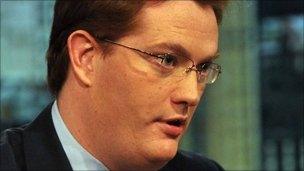Talking money at first minister's questions
- Published
- comments
Talking money.
An eminently sensible thing to do, given the relative lack of it in governmental circles and the impending statement by John Swinney on how he plans to cope with that paucity in allocating funds across Scotland.
With regard to that statement, which is due next week, I expect the finance secretary to do two things - aside, that is, from announcing the basic details for each department.
One is to attempt, as far as possible, to divert money into productive capital expenditure in order to sustain the wider economy: certainly, by enhancing substantially the use of non-profit distributing projects; most probably, by transferring funding from revenue to capital.
Two is to signal further significant structural reform in the public sector, building upon the model of moving to single police and fire services plus potential mergers in the university and college sector.
But that will come next week. The immediate controversy during questions to the First Minister surrounded the issue of public sector pensions.
In response to Willie Rennie of the Scottish Liberal Democrats, Alex Salmond drew attention to a looming row with Mr Rennie's chum, Danny Alexander, the chief secretary to the Treasury.
You'll recall, as noted here yesterday, that Mr Salmond has been lobbying for deferment of the proposal to increase public sector staff pension contributions from April next year.
He said that he had received a "stony" response from the Treasury.
Today he disclosed the full granite content. Mr Alexander had said "no" - and had gone further, noting that any delay in Scotland would have cash consequences for the Scottish government.
In short, if Scottish ministers decline to implement the hike in contributions from next April then their budget will be pegged back by £8.4m for each month's delay.

Danny Alexander said the pension changes were essential to protect the public purse
Mr Salmond described this as a "threatening letter". Which, from his standpoint, it is. Viewed from within the Treasury, it is seen rather more prosaically as a statement of inter-governmental funding rules.
The Treasury view, as expressed by Mr Alexander, is that the pension proposals have been discussed for an extended period and that they are essential in the interests of the public purse.
Further, they argue the UK government cannot be expected to bear the cost or funding shortfall which would be consequent upon a decision by the Scottish government to defer the imposition of higher pension contributions upon staff for whom Scottish ministers have direct responsibility in this context; that is NHS staff, teachers, police and fire fighters.
(Civil service pensions are reserved to Westminster, local government pensions are covered by a distinct scheme.)
The principle here is that a devolved administration cannot, within the broader structure, create financial consequences for UK ministers.
The Scottish government's wider argument is that the imposition of higher contributions upon a sector which is undergoing a pay freeze is cack-handed.
They want that decision deferred for the whole of the UK.